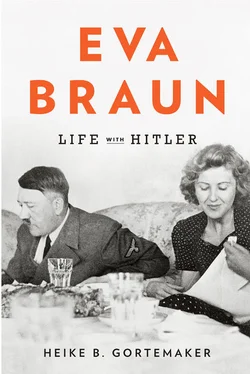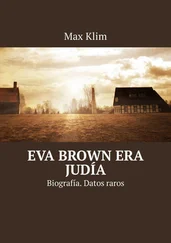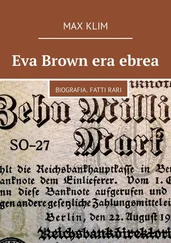Heike B. Görtemaker
EVA BRAUN
Life with Hitler
Translated from the German by Damion Searls
On March 7, 1945, when Eva Braun had a chauffeur bring her in a diplomatic car from Munich to Berlin, she wanted to write the final chapter of her story herself. 1That story had begun in 1929, in the offices of a Munich photographer, Heinrich Hoffmann, where she met the leader of a far-right political party that had not, at the time, been very successful: the National Socialist German Workers’ Party (Nationalsozialistiche Deutsche Arbeiterpartei, or NSDAP). That leader’s name was Adolf Hitler. Now she was driving to the capital, against his will, in order to die with him.
Hitler had ordered her to stay on the Obersalzberg, a mountain in the Bavarian Alps near Berchtesgaden, where he owned a large residence called the Berghof. Berlin was badly damaged, practically destroyed, after the Allied air strike of February 3; the air-raid sirens were sounding several times a day. The Soviet Red Army had reached the Oder River in January, while American and British forces, supported by numerous allies, were approaching from the west. As a result, no one in the Reich Chancellery expected Eva Braun to appear. Albert Speer remarked about her arrival in his memoir Inside the Third Reich: “Figuratively and in reality, with her presence a messenger of death moved into the bunker.” 2Be that as it may, she was also stepping out from the shadows of her existence as merely a mistress. Her name became inseparable from that of Hitler, and she herself, with their joint death, became a legend with him. Is that what she wanted?
No one, writes the British historian Ian Kershaw, shaped the twentieth century more powerfully than Adolf Hitler. The shocking experience of a “modern, advanced, cultured society… so rapidly sink[ing] into barbarity” 3has undeniably had consequences down to the present day. In the process, the name Hitler has become a symbol: around the world, standing for violence, inhumanity, racism, perverted nationalism, genocide, and war. Ever since January 30, 1933, when Hitler was named Chancellor by President Paul von Hindenburg and the NSDAP legally came to power, there have been countless attempts not only to describe the structure and institutions of the National Socialist dictatorship, but also, more than anything, to explain the “phenomenon” of Adolf Hitler. 4The debates continue even today.
Eva Braun, in contrast—the mistress for many years and eventually the wife of “evil incarnate”—has been seen as historically insignificant, as “a very pale shadow of the Führer,” 5even as “a historical disappointment,” in Hugh Trevor-Roper’s words. As nothing. The reason for this was the belief that Eva Braun “played no role in the decisions that led to the worst crimes of the century,” that she was nothing more than part of Hitler’s private pseudoparadise, which may in fact have made it possible for him to pursue “his monstrous horrors all the more persistently.” 6Thus Eva Braun has remained a marginal figure in the biographies of Hitler. The few books that treat her own life story emphasize her allegedly tragic “fate as a woman” and refrain from presenting Hitler’s girlfriend in her social, cultural, and political contexts—unless the book’s author has an ideological agenda of his or her own. 7
This disregard of Eva Braun as a historical figure is due in no small part to the dominant image of Hitler in the historical literature, because the question of whether Hitler should be portrayed as a human being at all is a controversial one even now. Some of his biographers maintain that their subject is a “nonperson”; Joachim C. Fest, for example, in the early 1970s, admitted that Hitler had apparently overwhelming power and “his own kind of greatness,” but criticized the paleness of his person and his rigid, statuelike, theatrical appearance, while remarking on Hitler’s “inability to lead an everyday life.” 8Decades later, Ian Kershaw said that Hitler’s “entire being” was given over to his role as “Führer,” [1] Translator’s note: “ Führer ,” which is also the ordinary German word meaning “leader,” is now known in English as Hitler’s title. It should be kept in mind that calling Hitler the “Führer” was heavily ideological, the way referring to someone as “Our Dear Leader” would be in English. For that reason, Görtemaker puts “Führer” in quotes throughout her book when it is an idolizing reference to Hitler.
to the point where he lacked a “private,” a “deeper” existence: the personal life of this despot who had an “extraordinary kind” of “charismatic” power consisted, according to Kershaw, of nothing more than a chain of “empty routines.” 9Even from a distance of sixty years, even while they are convinced that historical scholarship has “painstakingly taken the measure” of the “abyss,” historians persist in looking at “the grotesque face of the monster” when it comes to Hitler himself. 10
But doesn’t this interpretation risk succumbing to Hitler’s own self-presentation, according to which his individuality was of secondary importance? Do we not thereby dehumanize him, and as a result let him escape our critical understanding? It was Joseph Goebbels after all, Hitler’s Minister of Public Enlightenment and Propaganda, who tirelessly promulgated the idea that the “Führer” had sacrificed his private life and all of his individual happiness for the German People [2] Translator’s note: “ Volk ,” the German word for a people or tribe, also has a different connotation in the Nazi context. I have translated it as “the People” (capitalized), to emphasize its idealized, monolithic meaning, and have translated the adjective form, “völkisch,” as “Populist,” meaning “nationalist” or “xenophobic” in addition to the normal English sense of “populist.”
—that he stood “above all the daily worries and cares of ordinary mortals ‘like a rock in the sea.’” 11Are we not still creating an artificial figure when we look back at him in this way, one that only makes it harder for succeeding generations to confront their own histories and understand the nature of the Nazi dictatorship?
In no way do I mean to argue for an overemphasis on the individual in history. Nor am I suggesting that we should show “understanding” for the dictator’s private side, especially since that dictator has already become an object of dubious fascination as “the devil in person.” Rather, a serious, source-critical study of Eva Braun, which no one has carried out until now, offers a new perspective on Hitler, and one that can help undo his demonization.
Thus the question is: Who was this woman, actually, and what perspective does she open up onto this “criminal of the century”? The fact is that Eva Braun and Adolf Hitler were together for fourteen years—a relationship that ended only with their double suicide. Moreover, this relationship was one of Hitler’s few close personal ties to any woman at all. She was largely concealed from the German public, and in terms of external appearance, Eva Braun—young, blond, athletic, attractive, fun-loving—absolutely did not fit Hitler with his “psychopath’s face” (Joachim Fest’s phrase), who looks prim, stiff, and elderly in the private photographs in which he appears. Eva Braun, it is said, loved fashion, movies, and jazz; read works by Oscar Wilde (who was banned in Germany after 1933); liked to travel; and pursued sports to excess. 12Her life hardly corresponded to the petit bourgeois ideal of the German woman as propounded by Nazi ideology: bravely defending the husband’s home and her motherhood before all else. So what did connect Eva Braun to Hitler? What were her relations like with the men in the Nazi leader’s innermost circle—Hermann Göring, Albert Speer, and Martin Bormann? What light does this relationship shed on Hitler? Did he live with his lover in a kind of parallel private world that was fundamentally opposed to the official “Führer image”? Or is it in fact impossible to separate public and private in this way? Did both worlds belong together inseparably—for Eva Braun as well as for Hitler?
Читать дальше












